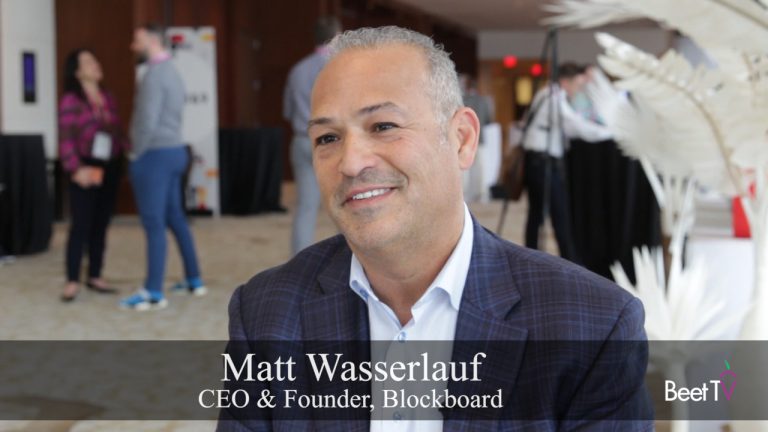
Video advertising has grown incredibly – but Matt Wasserlauf thinks much of it is going down the pan.
As CEO & Founder, Blockboard, Wasserlauf’s software platform uses blockchain to facilitate connected TV advertising with impression-level transparency.
In this video interview with Beet.TV, he says so much of the spend is getting wasted.
Scale of waste
“Roughly 30 to 40% of what is today a $50 billion video industry is being wasted,” he told Mike Shields for Beet.TV at the IAB’s recent Annual Leadership Meeting.
If Wasserlauf is right, that could mean upto $20 billion in wasted spend. Amongst the problems Wasserlauf sees are misrepresentation and ad-fraud.
“There’s way too much ad tech,” he says. “This is probably the most well attended event in the history of the IAB and I applaud that. But we’re too complex, we’re too complicated. I think we’re too cute, and from that is where a lot of this waste is coming from.
“We as an industry are representing what is this ‘premium-quality’ inventory, and selling something else. It’s a bait and switch that has become common practise and we need to change that.
“It’s very hard to extricate when we all have our hands in that pot.”
Blockchain power
Blockboard was founded four years ago to harness blockchain tech that uses a transparent ledger that validates every ad impression.
The aim is to increase accountability and minimize waste.
In January 2023, Blockboard announced FreeWheel premium CTV inventory would be available to its clients.
The company has welcomed the IAB’s plan for a universal ID for CTV.
Reset the model
For Wasserlauf, it’s all about “resetting the model”.
“We have to reset the model,” he says. “What’s going to come from that is repricing this inventory. CTV has a golden opportunity. We know that inventory is high-quality, there’s a huge demand for that inventory. There isn’t enough of it yet. It’s still growing.
“So, while we have this opportunity, we need to reset pricing, put the market in an entirely new place, a healthy place, and grow it from there.
“As an industry, we have a real opportunity here to get out ahead of that. We ought not to let the regulators lean in and change what we’re doing. The clock is ticking.”